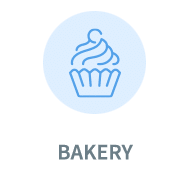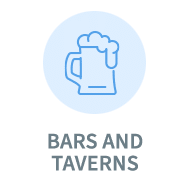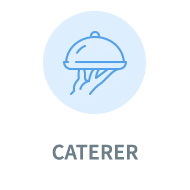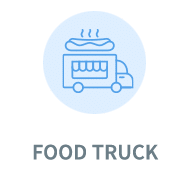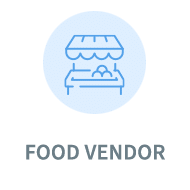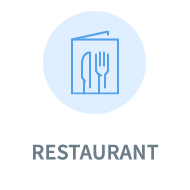Get a quote on Business Insurance
Whether you own a restaurant, catering service, or food truck, your business is exposed to a wide variety of risks. Food and hospitality businesses serve large volumes of customers, work with potentially dangerous equipment, and create a product that customers consume. All of these activities create huge liabilities, leading to an acute need for business insurance.
Food and Hospitality Insurance Types
Commercial property insurance protects the value of your business property from covered perils such as fire, windstorm, explosion, vandalism, and more. For businesses in the food and hospitality industry, commercial property is a crucial part of your everyday operations.
Whether you own a restaurant, bar, or hotel, your business depends on your physical property and customers being able to visit your establishment. If a disaster were to occur and your property was damaged or destroyed, it may be expensive and time-consuming to cover the costs of repair without insurance. Commercial property insurance can help by providing funds to repair or replace damaged property, from building structures to valuable equipment.
Example:
- A fire breaks out in your restaurant kitchen, damaging your kitchen equipment and refrigeration unit. All of the food in your refrigeration unit must be thrown out due to spoilage. Your commercial property insurance policy would cover the costs of repairing your kitchen and replacing the spoiled food items.
Equipment breakdown insurance covers the cost to repair or replace malfunctioning or damaged equipment. While it may seem like equipment breakdowns would be covered under a commercial property insurance policy, it actually depends on how the equipment is damaged.
If the equipment is damaged by an external force, such as a fire or storm, a commercial property policy would likely provide coverage. However, if the equipment is damaged due to an internal force, such as mechanical failure, equipment breakdown insurance would provide coverage. This is an important coverage for those food and hospitality businesses that rely heavily on key equipment, like refrigeration units and cooking equipment.
Example:
- The refrigeration unit in your restaurant suddenly stops working, likely due to some mechanical malfunction or electrical short within the unit. Equipment breakdown insurance would provide the funds to repair or replace the damaged unit.
General liability insurance protects businesses from third-party claims of accidental bodily injury, property damage, personal injury, and advertising injury. For food and hospitality businesses, general liability is a must-have coverage, as much of your business involves customers dining, visiting, or staying at your business premises. If an accident occurs on your property, and a customer is injured, your business could be held liable. General liability insurance can cover the legal costs, judgements, or settlements related to a lawsuit, as well as medical payments for the injured individual.
Example:
- A customer at your cocktail bar is walking to the bathroom and slips on some wet flooring, causing her to fall and injure her wrist. General liability insurance would provide funds to cover the injured customer’s medical fees, as well as any legal fees if the customer ends up suing your business.
Product liability insurance protects your business if products that you sell end up causing bodily injury or property damage. For food and hospitality businesses, this can include food that you sell and serve to customers. If a customer falls ill because of the food you serve, they could sue, and product liability insurance would provide coverage. Product liability coverage is typically included within general liability insurance, under products and completed operations coverage, but can be purchased separately for companies with higher-risk products.
Example:
- You own a popular barbecue restaurant and have recently decided to bottle and sell your house barbecue sauce. The first batch you create sells out in a matter of days. Soon after, though, a number of customers complain of suffering severe food poisoning as a result of eating your bottled barbecue sauce. A group of customers files suit against your restaurant. Product liability insurance would provide funds to address the lawsuit.
Commercial crime insurance protects your business against financial losses resulting from crimes such as theft, burglary, robbery, forgery, and fraud. This coverage can protect against third-party crimes as well as crimes committed by your own employees. For food and hospitality businesses that may deal with a large volume of cash receipts or have expensive items like specialty liquor on hand, commercial crime is an important coverage to secure.
Example:
- An employee at your café closes up shop one night. The next day, you notice that $2,000 is missing from your safe. Security footage shows that it was your employee who stole the money, and now she is nowhere to be found. Your commercial crime policy would cover the losses.
Business interruption insurance, also called business income insurance, can provide financial help for your business if you need to temporarily cease operations due to property damage. For food and hospitality businesses that depend heavily on their physical locations, this coverage can keep your business afloat in tough times. If a fire, storm, or other covered peril damages your business property, business interruption insurance can provide coverage for loss of income and operating expenses while your business is temporarily closed. Business interruption insurance is typically added onto a commercial property policy.
Example:
- A severe storm damages the roof of your bed and breakfast inn, causing leaks in multiple rooms. You must shut down your inn temporarily while the roof is repaired. Business interruption insurance would provide coverage for lost profits your business suffers while you are closed for repairs.
Commercial auto insurance protects the value of your company vehicles and provides coverage for third-party bodily injury or property damage liability in the case of a crash involving your company vehicles. For food and hospitality businesses that own or lease vehicles, from delivery trucks to catering vans, commercial auto insurance is a critical and legally required coverage.
Example:
- Your catering business is working a wedding at a mountaintop resort. As your team is driving up a winding mountain road, one of your employees accidentally crashes one of your company vans into a parked car on the side of the road. Commercial auto insurance would cover the damages to both vehicles.
Hired and non-owned auto insurance provides liability coverage in the event that you or an employee is involved in a car crash while driving a personal vehicle for work purposes. This coverage is common for restaurants whose employees use their own vehicles for food delivery or for small hotels or inns that may offer to pick up customers from the airport using personal vehicles. Hired and non-owned auto insurance covers third-party claims of bodily injury or property damage and is commonly added by endorsement to a commercial auto or general liability policy.
Example:
- Your restaurant offers free delivery, and your employees often use their own personal vehicles. While out on a delivery, one of your employees is distracted and rear-ends another vehicle. The claim goes beyond what your employee’s personal auto insurance can cover, so your company’s hired and non-owned auto insurance would provide coverage.
Workers’ compensation insurance provides financial and medical benefits for employees who suffer occupational injuries or diseases. Workers’ comp also provides death benefits for an employee’s dependents in the case of a work-related death. For food and hospitality businesses, workers’ comp is not only an important coverage, but it is also likely required by your state. Accidents can happen at any time, especially in restaurant kitchens, and workers’ comp can help pay for medical expenses, lost income, and rehabilitation costs for injured employees.
Example:
- Your sous-chef severely burns her arm in a grease fire in your restaurant’s kitchen. She requires medical treatment and is unable to work for at least a few weeks. Workers’ compensation insurance would pay for her medical expenses and a portion of her lost income while she is recovering.
Additional Insurance Coverage
- Liquor liability insurance provides coverage against third-party claims of bodily injury and property damage caused by an individual to whom your business served or sold alcohol. For bars, restaurants, wineries, breweries, and hotels, this is an important and often required liability coverage.
- Cyber liability insurance protects your business from liability and property losses caused by cyberattacks such as hacks, data breaches, viruses, and more. This is an important coverage for businesses that store sensitive data on employees or customers, such as credit card information or contact information.
- Bailee’s customer insurance covers your business for losses to customer property in your care, custody, or control. This coverage is important for businesses such as hotels or restaurants that may take temporary possession of customer luggage, coats, or cars.
- Employment practices liability insurance provides coverage against prospective, current, and former employee claims of wrongful treatment, including discrimination, harassment, retaliation, or other employment-related issues.
- A business owner’s policy (BOP) combines general liability, commercial property, business interruption, and extra expense coverage into a convenient package for qualified small businesses. BOPs can be a good option for smaller businesses, providing them with a wide range of coverage at a lower cost.
Insurance Coverage for Your Employees
Along with making sure that your business is financially covered, it’s wise to also ensure that you’re providing your employees with adequate insurance coverage. Not only can sponsored group insurance coverage provide your team with a financial safety net, but it can also help your company attract talent and retain employees.
Group health insurance helps your employees pay for medical and healthcare expenditures, including everything from primary care to hospitalizations and surgeries. Offering health insurance to your employees can keep your employees in better health, which is important in a rigorous and physically demanding industry such as food and hospitality. In addition, health coverage is increasingly an important factor in employment decisions, and many workers are looking for businesses that will provide them with comprehensive coverage.
Group life insurance provides a financial payment to an employee’s family or other survivors if the employee unexpectedly dies. The death does not have to be work-related. Although individuals can purchase life insurance on their own, as an employer-sponsored group, you can usually obtain better rates than an employee could get on their own.
Group disability insurance provides income to employees who cannot work as a result of non-work-related injuries.
What food and hospitality businesses need insurance?
It’s safe to assume that every food and hospitality business will need some form of business insurance. Whether you operate a restaurant, bar, or hotel, there are numerous liabilities that you may face, and accidents or mistakes can happen to just about anyone. Business insurance comes in many forms and can protect your business from a myriad of risks, from a slip-and-fall incident that occurs on your business premises to a fire that damages your building.
If your food and hospitality business meets any of the following criteria, you should consider investing in business insurance coverage:
- You own or lease commercial property
- You service customers on your business property
- You sell products to customers
- Your business owns valuable property, such as computers or cooking equipment
- You store sensitive data on employees or customers
- Your business owns or leases vehicles
- You employ others
Commercial insurance can cover a wide variety of food and hospitality businesses. Some common businesses and professions that need insurance include:
Choosing an Insurance Company
The first step in acquiring insurance for your food and hospitality business is finding the right insurance company to partner with. Below, we’ve highlighted a few of our trusted insurance partners, who offer a variety of coverage suitable for food and hospitality businesses. We’ve also included a few factors that are important for your business to consider when evaluating insurers.
| Provider | General Liability | Professional Liability | Business Owner's Policy |
|---|---|---|---|
| Embroker | ?? | ?? | ?? |
| CoverageSmith | ?? | ?? | ?? |
| CoverWallet | ?? | ?? | ?? |
| Hiscox | ?? | ?? | ?? |
| Thimble | ?? | ?? | ?? |
Financial strength. While you may think getting the best-priced policy should be your main goal, it is more important to ensure you purchase insurance from a financially stable provider. It’s worth remembering that insurance claims are paid directly from the finances available to the insurance company. In other words, if the insurance provider is financially stable, they will be able to fulfill their claims commitment. When an insurance company does not have financial stability, it may collapse and be unable to support you.
While this is rare, it does happen. You want to know your company is always secure and certainly don’t want the surprise of finding out your insurance provider cannot cover your losses when you make a claim.
Of course, this leads to the obvious question: How do you know your insurance company has financial strength? Unfortunately, it is not as simple as just purchasing a policy from the biggest industry names because even giant insurers go through periods of financial instability. Luckily, there are rating agencies that grade insurance companies in terms of their financial strength. Some of the major rating agencies are Fitch, Standard & Poor’s, AM Best, and Moody’s.
Price. Cost is important for any business, but the price of insurance is not the only factor. Instead, your food and hospitality business will be better served by looking for the policy that is the most affordable but also meets all your requirements.
Different insurers have different methods for determining the premium you will pay, although there are some industry standards. For insurance companies, pricing is all about determining how much risk your business presents. The key to finding the best deal that meets your company needs is to shop around. Speak to insurers, use online quote engines, and work with brokers to ensure you get the coverage you require to protect your business.
Customer service. While you want your insurance provider to be financially stable and priced competitively, it is also important that you can engage with the company. It is possible you will need to make a claim, change policy details, or update personal information. In these cases, you want to deal with a company that has good customer care. While most major carriers have good customer service records, some spend more time and effort on ensuring their customers are taken care of. This may seem unimportant, but dealing with welcoming, qualified, and thoughtful professionals will be vital during a claims process.
Final Word
The food and hospitality industry can be a challenging environment, with a variety of risks that have the potential to make or break your business. Ensuring that you’ve invested in a comprehensive insurance plan is a crucial step in building a safety net for you, your company, and your employees. With the right coverage, your business will be able to survive any unexpected disasters, giving you the peace of mind to focus on building and growing your business.


